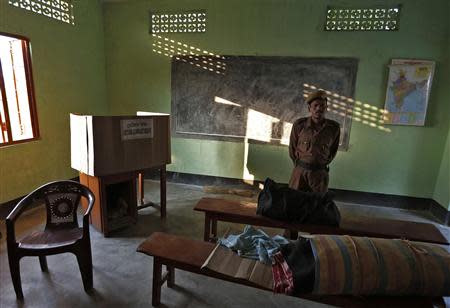India to kick off world's biggest election in remote northeast
By Shyamantha Asokan LAHOAL, India (Reuters) - Indians start voting in the world's biggest ever election on Monday, with a Hindu nationalist opposition party that has promised economic rejuvenation and jobs tipped to emerge as the clear leader but likely to fall short of an absolute majority. The elections to choose members to the 543-seat Lok Sabha, or House of the People, will be spread over five weeks, kicking off in two small northeastern states, then spreading to the northern Himalayan plateaus, western deserts and tropical south before ending in the densely-populated northern plains. Results are due on May 16. The Bharatiya Janata Party (BJP), led by Hindu nationalist Narendra Modi, and its allies are forecast to win the biggest chunk of seats but fall shy of a majority, according to a poll released this week by respected Indian pollsters CSDS. In such a situation, a coalition government led by the BJP is seen as the most likely outcome. India's 815 million voters are set to inflict a resounding defeat on the ruling Congress party, led by the Nehru-Gandhi dynasty, surveys show, after the longest economic slowdown since the 1980s put the brakes on development and job creation in a country where half of the population is under 25 years old. But Modi is tainted by accusations that he failed to stop or even encouraged anti-Muslim riots in 2002 in the state of Gujarat, where he is chief minister. At least 1,000 people died in the violence, most of them Muslims. Modi has denied the charges and a Supreme Court inquiry found no evidence to prosecute him. India's remote northeast, a lush but underdeveloped border region of eight states home to just 27.4 million voters, is a test case for the appeal of Modi's promises to fill India with new highways and fast trains and to take a tough line on frontier disputes with neighbors. China claims sections of the region. "Modi is the best person for prime minister...because we need industries that can create jobs," said Jyotirmoy Sharma, a manager at a tea factory who lives in Lahoal village in Assam, one of the two states due to vote on Monday. He voted for the ruling Congress party in India's last two national elections in 2004 and 2009. "Young people can't find good work here - the jobs available are just about picking tea leaves," said Sharma, who worries that his 14-year-old son will have to leave the area when he finishes school. Assam is India's biggest tea-growing state. Northeastern India is one of the few remaining strongholds for Congress. The CSDS poll found that almost half of voters in Assam, who have one of the country's lowest per capita incomes and often still rely on the centre-left Congress' welfare schemes, are set to support the party. Most of the village's residents, who work as casual tea pickers on surrounding plantations, told Reuters they planned to vote for Congress. Many had not heard of Modi. The debate in New Delhi is focused on whether Modi can win enough seats to secure a stable coalition with India's increasingly powerful regional parties and push through his promised reforms. India's diverse electorate and parliamentary system mean that local leaders - and local issues such as their caste or ethnic group - still hold great sway. In some constituencies this could stymie the BJP, which has run a presidential-style campaign focused wholly on Modi. "I vote for the local candidate - that is who affects my life," said Shanti Naik, a woman selling biscuits and shampoo sachets at a stall in Lahoal who said she planned to vote for Congress. "Whoever is in Delhi, it doesn't bother me." (Additional reporting by Biswajyoti Das, Editing by Raju Gopalakrishnan)




